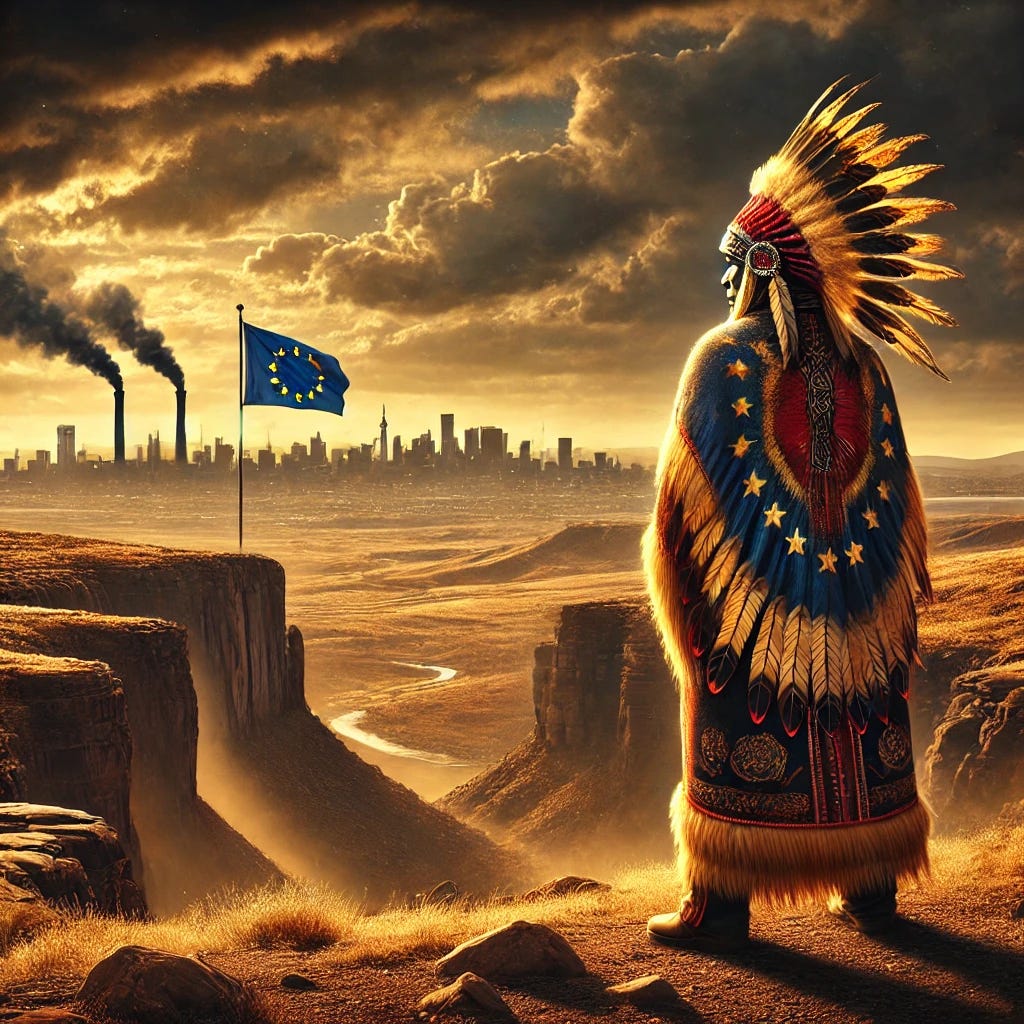Indigenous Sovereignty vs. Globalist Bureaucracy: Why Joining the EU Means Losing Our Land—Again
To the average citizen, this may seem like just another political discussion. But for Indigenous nations, it raises an urgent and troubling question: How many times must we give away our land?
For Indigenous peoples, the idea of sovereignty is not just a legal concept—it’s a fundamental truth. We were here long before colonial borders were drawn, and we remain tied to the land, regardless of political shifts. Yet, in today’s world, sovereignty is increasingly sacrificed on the altar of globalism, buried beneath layers of bureaucracy that favour corporate and state control over self-determination.
Now, some voices are floating the idea of Canada—or parts of it—joining the European Union. To the average citizen, this may seem like just another political discussion. But for Indigenous nations, it raises an urgent and troubling question: How many times must we give away our land?
Indigenous communities have fought for generations to assert our rights to land, resources, and self-governance, often against impossible odds. The Canadian government has already handed over much of its own authority to international organizations, whether through the UN, the World Economic Forum, or global trade agreements that supersede domestic decision-making. If Canada—or even just parts of it—were to integrate into the EU, it would introduce yet another external power structure that would dictate policy from thousands of kilometers away.
The EU functions through a dense bureaucracy, where unelected officials in Brussels decide the fate of member nations through regulatory frameworks designed to consolidate power, not distribute it. Indigenous sovereignty, already fragile under federal and provincial control, would be suffocated entirely.
One of the biggest concerns for Indigenous nations is land ownership. Treaties, self-governance agreements, and even the limited rights we’ve fought for in Canadian courts would be overshadowed by EU laws and policies. The European Union has a long history of prioritizing economic integration over local governance. Just look at what happened to member states like Greece or Ireland, where land and resources were leveraged against national debt obligations.
If Canada were to become entangled in EU jurisdiction, Indigenous land could be subjected to EU property laws, resource extraction policies, and environmental mandates that serve corporate interests rather than the people who have lived on and protected this land for millennia. What happens when land claims must be appealed, not in Canada, but through an EU court? How long will that process take? How much red tape will stand between us and justice?
When Indigenous nations challenge Canada on treaty violations or land rights, at least there is a path—however flawed—to restitution. But if land disputes become subject to EU governance, the fight becomes even more complex.
The EU is designed to prevent the return of land and power to smaller groups. It operates through treaties that take precedence over national law, making it nearly impossible to reclaim lost sovereignty once a country signs over authority. Just ask the UK—Brexit showed how difficult it is to leave the EU once you're in. For Indigenous nations, already struggling against Canada’s reluctance to honor agreements, adding another layer of bureaucracy would make justice nearly unreachable.
Indigenous people have always been forced to navigate systems built to keep us out. The Canadian government has systematically stolen land, broken treaties, and funnelled our wealth into its own coffers. But at least there is some recognition, however token, of Indigenous rights within the existing framework.
If Canada integrates into the EU, we risk returning to the early colonial era, when European powers divided the land among themselves with no regard for the people who lived here. The difference now is that the decisions will be made in Brussels boardrooms, with no accountability to Indigenous nations.
The conversation about joining the EU should be a wake-up call. If Indigenous people do not take a strong stand now, we may wake up one day to find that our struggle for sovereignty has been lost, not just to Ottawa, but to a distant bureaucracy that has no understanding or respect for our rights.
The solution isn’t to hand more power to international institutions—it’s to demand the return of our land, resources, and self-governance from the governments that have stolen them. Sovereignty isn’t something we ask for. It’s something we assert. And we will not trade it away for a seat at a table that was never meant for us.
Darren Grimes






and wow - have a listen < 10 min YT https://lawyerlisa.substack.com/p/eu-plan-to-use-europeans-private
I had no idea this was happening and so fast!
https://whatsupcanada.substack.com/p/canada-is-now-european?publication_id=2342396&post_id=159305250&isFreemail=true&r=1b895l&triedRedirect=true